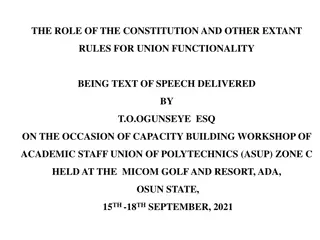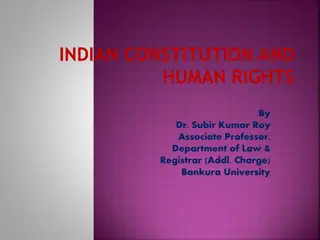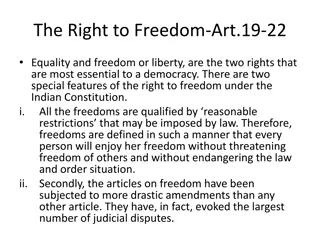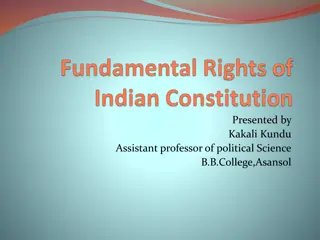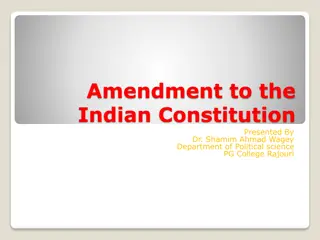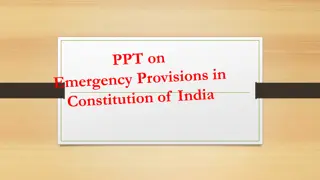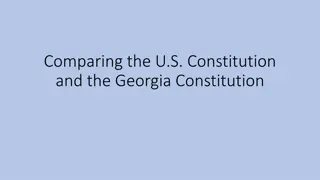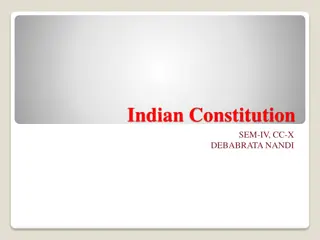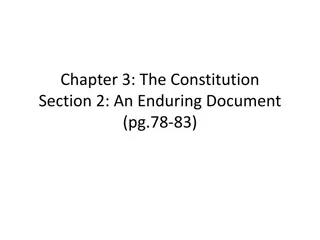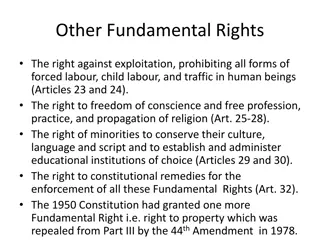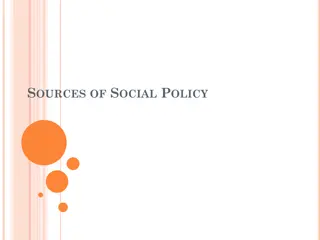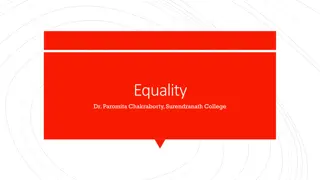Understanding Fundamental Right to Equality in Indian Constitution
The concept of equality before the law and equal protection of laws as enshrined in Articles 14 to 18 of the Indian Constitution are essential for ensuring equal status and opportunities for all citizens. Article 14 ensures equality before the law, prohibiting the state from denying any person equal protection of the laws. It delineates the principles of equality in a broader sense and stresses the importance of uniform treatment for individuals in similar circumstances. Understanding these fundamental rights is crucial in upholding justice and fairness within the legal framework of the country.
Download Presentation

Please find below an Image/Link to download the presentation.
The content on the website is provided AS IS for your information and personal use only. It may not be sold, licensed, or shared on other websites without obtaining consent from the author. Download presentation by click this link. If you encounter any issues during the download, it is possible that the publisher has removed the file from their server.
E N D
Presentation Transcript
CONSTITUTIONAL LAW - II (FUNDAMENTAL RIGHTS) LAW 637 ARTICLE 14 Himanshu Kumar Singh Assistant Professor of Law Indian Institute to Legal Studies Cooch Behar
RIGHT TO EQUALITY (Art 14 -18) To secure to all citizens, equality of Status and of Opportunity Our constitutional goal enshrined in the Preamble. Art 14 -18 are the provisions made in confirmed with the idea of equality enshrined in the Preamble. Art 14 incorporates the doctrine of Equality in general and wider sense. Art 15 18 contains specific instances of the general doctrine of equality incorporated in Art 14.
RIGHT TO EQUALITY (Art 14 -18) To secure to all citizens, equality of Status and of Opportunity Our constitutional goal enshrined in the Preamble. Art 14 -18 are the provisions made in confirmed with the idea of equality enshrined in the Preamble. Art 14 incorporates the doctrine of Equality in general and wider sense. Art 15 18 contains specific instances of the general doctrine of equality incorporated in Art 14.
ARTICLE 14 Art 14. Equality before law - The State shall not deny to any person equality before the law or the equal protection of the laws within the territory of India. Art 14 imposes a negative obligation upon the State. Art 14 is mandatory in nature and its protection is available to any person. Classification of persons into citizens and aliens is not valid for the purposes of Art 14.
ARTICLE 14 Equality before the law Term of English Origin Implies that no one is above the law and every person is subject to the jurisdiction of ordinary tribunals. Term is Negative in nature which also suggest the absence of privilege in favour of any person.
ARTICLE 14 Equal Protection of the laws Term of American Origin (inserted under US Constitution vide 14th Amendment to the US Constitution, 1868). Implies equal treatment in equal circumstances. Term is Positive in nature which also suggest the applicability of uniform law for persons equally situated.
Equality before the law vis a vis Equal Protection of the laws State of West Bengal v Anwar Ali Sarkar, 1952, SC, held : The two expressions Equality before the law and Equal Protection of the laws have no substantial difference. Both imbibe the idea of equal justice. Violation of any of the two is bound to affect the other. Equal protection of the laws is the natural corollary of the Equality before the law. Equality means equals should be treated alike and not that unequals should be treated alike.
NEED OF CLASSIFICATION UNDER ARTICLE 14 Absolute Equality is impracticable as people are different from each other in their nature, disposition, efficiency, capacity, personality etc. Human needs also differ. People also differ as regards to the requirements of particular office or place. Art 14 prohibits Class Legislation but permits Reasonable Classification. Class Legislation is undesired discrimination. Picking out a few out of a larger body would amount to class legislation if it is done without any reasonable basis. Conferment of privilege or inflictment of penalty by arbitrary picking up few, infringes equality. Reasonable Classification is a desirable and proper discrimination. It does not violate equality. Reasonable Classification is inevitable to achieve specific ends.
REASONABLE CLASSIFICATION Landmark Judgments RK Dalmia v Justice Tendolkar, 1958, SC, held: For a classification to be termed as Reasonable, it must be based on intelligible differentia. The classification and the objects thereof, must have rational nexus. Reasonable Classification does not imply scientific completeness or logical exactness. Equal treatment does not mean identical treatment. Classification may be made on different grounds like geographical, object wise or professional or otherwise. In appropriate cases, even a single individual may constitute a class in itself. Art 14 prohibits discrimination on substantive as well as procedural grounds.
REASONABLE CLASSIFICATION Landmark Judgments EP Royappa v State of Tamil Nadu, 1974, SC, laid down the new principle of Equality: Equality is a dynamic concept. It has many aspects and dimensions. It can t be confined within traditional doctrinaire limits. Equality is antithetic to arbitrariness, as both are sworn enemies. Therefore, an arbitrary action violates Art 14. Maneka Gandhi v Union of India, 1978 SC, the above principle of Equality was reiterated. It was further held: Art. 14 strikes at arbitrariness. The doctrine of Equality is not a paraphrase of Art 14. It is not the object & end of Art. 14 either. It is only a judicial formula. No arbitrary State action can be justifies even by resorting to doctrine of classification.




